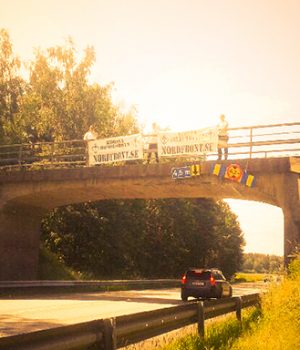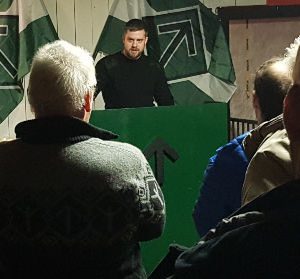IDEOLOGY. Readers often send us questions regarding our views on certain issues. One of the most frequent subjects we’re asked about is the National Socialist position on animal rights. In this article, the founder of the Nordic Resistance Movement, Klas Lund, responds.

It’s a widely unacknowledged fact of history that National Socialist Germany was the first nation to achieve political and legislative breakthroughs on the issues of animal rights and environmentalism. Even today, 80 years on, many countries the world over still have no kind of animal protection laws at all, and it’s only in Northern Europe that real progress has been made.
In its nascent stages, National Socialism developed an organic outlook on the world, in contrast to the prevailing anthropocentric and geocentric mindsets largely inherited from Judeo-Christianity. The anthropocentric worldview regarded animals as mere creatures that could serve humans, machines that lacked a “soul” (an opinion held by the Church, Pope Pius IX, Descartes, among others). National Socialism opposed this doctrine and considered man a fellow animal, although on a higher level. He was therefore not automatically worth more than other creatures but was a part of the natural order and subject to the laws of nature.
National Socialist Germany was revolutionary in introducing animal and wildlife protection laws that safeguarded animals from inhumane slaughter and harmful experiments. These laws were established on the principle that animals should be protected for their own sake, rather than for profit. However, the idea of man being part of nature was considered dangerous by many “anti-Nazis”, who believed assigning greater value to animals inferred some kind of “lowering” of humanity and, following this logic, indirectly paved the way for the alleged genocide of the Jews. Although it sounds ridiculous, this thought-line nevertheless forms the basis for one of the recurring critiques of the National Socialist position on animal rights. A similar argument is used today against those who believe overpopulation is destroying the environment. Such people are labelled “environmental fanatics”, purely because they have come to the rational conclusion that the global population needs to be reduced one way or another so that life on Earth can be saved.
For Christians and those who have inherited an anthropocentric view, human life is regarded as “holy” and worth more than that of other animals. We, on the other hand, understand there are no objective grounds for such beliefs, and recognise they originate from our subjective view of humanity. Such people are basically demanding special and existential rights for themselves, based on the perception that they are “chosen”.

We Nords can be proud that the Swedish scientist Carl Linnaeus was one of the first who dared to oppose such dogmas. Linnaeus claimed that humans were primates and therefore also animals, a view that earned him criticism from the Christian authorities of the time. He also maintained that animals could be considered to have souls and therefore ought to be well treated.
This view correlates with the National Socialist stance on animal rights. Even though human beings have long been forced to kill to live, just like other animals (at least until the invention of modern agriculture), it does not follow that we have a right to cause our fellow creatures unnecessary suffering. On the contrary, we higher beings are duty-bound to treat animals with as much decency as humanly possible. If we choose to remain meat-eaters, we have no choice but to kill animals for food, but doing so in a way that causes them to live in undignified and distressing circumstances to maximise profits is completely reprehensible. The keeping of animals in captivity to produce luxury goods is also unacceptable; for example, the mink farms that are still permitted in the Nordics.
Despite such instances, however, there has generally been much progress in the field of animal rights in the Nordic countries, especially when compared to some other parts of the world, where animals have no legal or moral protection whatsoever. It’s very difficult for some Westerners to understand just how badly animals can be treated in other cultures, and a lot of people would rather bury their heads in the sand than confront the truth. For example, I recently read an article about an animal rights group in China that documented how raccoons are skinned alive for their pelts. The day before another story related how a Chinese she-bear killed its own cub and then itself to avoid a life in captivity in which both mother and cub would regularly have their gall bladders emptied to make some kind of “medicine”. It was difficult to read the whole thing, and reading the two articles combined made me feel ill for days. And to think we’re told this communist dictatorship will save our economy… Can you imagine?
Put simply, any type of animal testing that causes suffering should be banned. Painful experiments on animals cannot be justified just because they provide us with medication, and certainly not in cases of non-medicinal products. We must find other ways to carry out such research, regardless of whether it costs us more. Current punishments for animal cruelty are also far too lenient, and, in a National Socialist state, such acts would be viewed as very serious offences. In my personal opinion, people guilty of extreme animal cruelty have acted so reprehensibly they have forfeited their right to live.
Finally, I am of the firm opinion that a National Socialist society must work diligently and purposefully to return a large number of people to the countryside. We have to combat the current trend of ever-expanding agriculture, and a National Socialist state would strive for small-scale agriculture and more self-sufficiency. The state must also have a well-developed system for controlling animal husbandry and slaughterhouses. Instead of large central slaughterhouses, we should try to increase local production and consumption, and work towards ensuring animals are slaughtered on local farms, rather than being transported from their natural habitat where they have been raised and feel secure. We also need to combat the industrialisation of agriculture and animal husbandry, meaning a ban on genetically modified foods, artificial fertilisers and chemical pesticides.

























